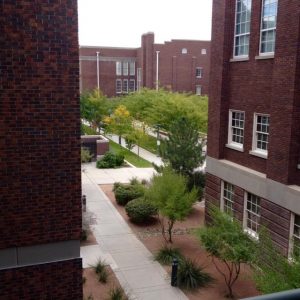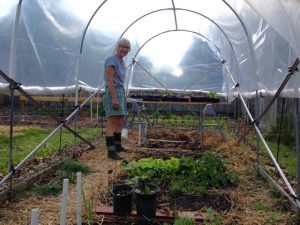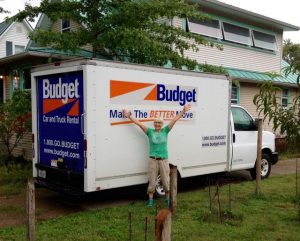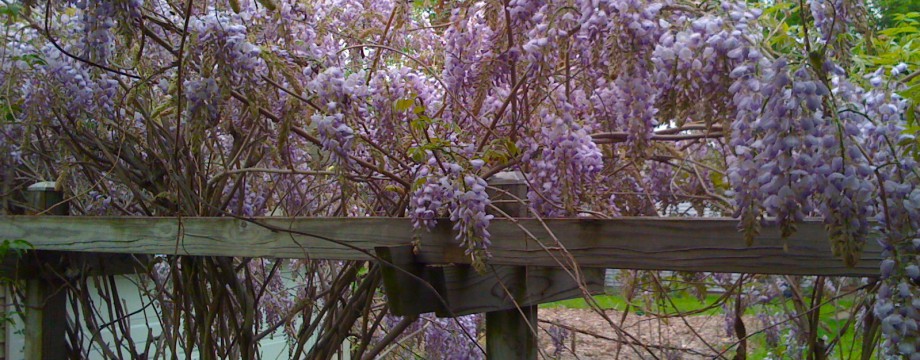I wrote this in preparation for a talk I gave at an AAUW meeting in Goshen, Indiana in November 2015. Given that, while I was speaking, I hardly ever looked at what I wrote , the talk was likely nothing like what was on the papers I was holding.
At the time, I was looking forward to as yet an unknown path – a move to a new location with no definite job possibilities lined up, a transition to a more urban lifestyle in an apartment without a huge yard (or any yard) to use for gardening.
That move happened nearly eight months ago. I feel pretty settled, though I am still adjusting to my new identity in a new place (more on that in a later post). As I sit here, on the porch of the Albuquerque Press Club, with the view of the mountains to the east and the view of downtown to the west, I am thankful for all that has happened, for all my experiences and all my adventures, and the full life that I am living.
At the end of May, 2013, I went from being a tenured college professor to being an intern on a small organic farm. That was not the usual upwardly progressing career track. There was a lot of curiosity from people about why I did what I did. I’ll talk a little about that and about how things have gone for the past 2 1/2 years.
I grew up with a parent, my mother, who strongly valued education, particularly science education. She had wanted to be a mechanical engineer, but WWII and turmoil in Eastern Europe waylaid those plans. But she made sure I did well in math and science. When I registered for my high school freshman classes, choosing to postpone biology until my sophomore year and take an art class instead, she made me re-register and take that biology class. Though my high school was huge, with about 650 students in each class, my senior year math classes were tiny 8-12 students per class, all boys with me the only girl. That trend of being the only girl continued into college where I was the only female who was majoring in physics (I think that I was perhaps only the 2nd female to graduate with a major in physics) and graduate school, where, again, I was the only female in my graduate school entering class (mathematics, Northwestern University).
My first professional job, while I was finishing my dissertation, was with an options trading firm in downtown Chicago. After finishing my Ph.D., took a position in a research lab at the University of Washington. In 1993, I began teaching mathematics, first at Seattle Pacific University and then at Goshen College. So I taught mathematics for nearly 20 years (subtracting a year where I took a leave of absence.)
I can’t say that I always felt comfortable in that job. For the most part, I liked teaching andI think I was a good teacher. I really enjoyed prepping. I didn’t enjoy grading quite so much – at least not that part of grading that involved assigning points or assigning a grade. But I sometimes felt like I didn’t measure up.
I had chosen to come to Goshen College in part because the expectations for “professional activity” were defined rather broadly and not solely by how many peer reviewed publications I had. I had worked in a research lab, but that was with a group of other scientists with each one of us contributing just part of what made up the whole of the project. At a small liberal arts school, with no other collaborators, I felt a bit lost – I didn’t know how to fulfill the research expectations of academia. Research, in isolation, is just not something I could do well. So there were times I felt like a fraud – an imposter. My lack of self-confidence and my feelings of inadequacy were especially prominent whenever I had to do a self-evaluation (for performance review, for applications for promotions and tenure, for my sabbatical application.)
I also am blessed (or cursed) with a wide range of interests. Even when I was teaching, I tried my hand at running a little fiber arts studio – selling hand-spun yarn and knitted and woven pieces at the farmer’s market. I became the organist at 8th St. Mennonite. I found myself very busy.
All through this, in the back of my mind, lurked an idea, a dream, of having a little 5 acre sustainable farm. Year after year I kept expanding my own garden. But, because of my teaching responsibilities, I always felt like I got a late start on the growing season, planting nothing until after May term. And I cut short anything I did in the fall because I started working on the next year’s classes in late July.

The problem was, I loved teaching. I loved class prep. I could spend hours on class prep. So other things would be pushed to lower priority level.
But I still had that dream. I contemplated my choices. I could wait until I retired – but that would be many years away, and who knows how I would feel (physically) then. Or I could do something now. Not one to forge ahead without a plan, I began talking with some local farmers to see how I could plug in to their operation so that I could have the experience of my little 5 acre farm without having to actually go off and buy 5 acres somewhere. When I had a year long position lined up at Clay Bottom Farm, I announced my decision to leave Goshen College.
After my year was up, I stayed at Clay Bottom, though I no longer worked full time for them. I must say that the past 2 1/2 years have been quite enjoyable. I learned a lot, about farming, and about myself. I really liked being outdoors and working a rather physical job. I looked forward to times of solitude outdoors, communing with nature in very tangible ways. That aspect of my work nurtured the introvert side of me. But, on the flip side, I also enjoyed interacting with customers at Clay Bottom’s booth, though at the end of the day I felt exhausted. I expanded my own garden enterprise, my urban nano-farm, and was able to sell some of my own produce at the farmer’s market booth.
What surprised me a bit was all the attention I was getting. People were very curious about my move from teaching to farming – not the usual career trajectory. I was getting requests for interviews. Stories about me appeared in the Goshen College newspaper (the Record) and in local newspapers (Etruth). I started feeling a bit like a celebrity (not at all what I was looking to become).
At the same time I was having a bit of a hard time adjusting to this new identity. I was not sure what to call myself or how to define myself.
First of all, there was the assumption that I had “retired”. That was not how I viewed my leaving the teaching profession. Yes, I suppose, in a sense, I had “retired” from teaching since I had left that profession. But in our society, the word “retirement” usually means that someone, of a certain age, has left the work-force. If I had been 20, or even 10, years younger no one would use the word “retire” in connection to what I did. In addition, my former employer, the college, did not consider my leaving as “retiring”. So I felt like I had to battle that view. True, I was not longer making a lot of money, but I was still employed and actively working on a new career path.
But that brings up the next thing that was a bit troubling. What do I say when people ask me what it is that I do? I never thought of myself as a boastful or proud person, but I realized that I had liked telling people that I was a math professor. Maybe I really did like that prestige that went along with the position. I was not that comfortable saying “I’m a farmer”. Part of that unease was because I really didn’t have my own farm – I was mostly working at someone else’s farm. (Indeed, it was almost a year before I started using the pronoun “we” when answering customer’s questions about what was happening at Clay Bottom Farm – “We grow salad greens during winter”, “Last year, during the polar vortex, our carrots froze even though they were in a greenhouse”, “Yes, we are growing ginger this year.”) Is one a farmer when one works for others. Could I say I’m an “urban farmer”? But, did my little urban nano-farm – aka my pretty big garden count? I just didn’t know what to say.
Because of this uncertainty in how to define myself, I more fully embraced my other interests – my “side jobs” – being a fiber artist, being an organist. I had never before responded to the question of what is it that I do with “I’m an organist” or “I’m a fiber artist”. So when I still felt uncomfortable saying “I’m a farmer”, I began saying “I’m an organist” or “I’m a fiber artist”. And I wondered why I had never owned up to those aspects of my life before. It was probably because my primary work was teaching. But especially now, when I am not working full time at Clay Bottom Farm, and what I do for work is a mix of things, I don’t have any job that is my primary work. I still find myself stumbling over how to answer the question of what work I do.
A part of me also wondered if I was letting feminism down. I consider myself a pretty strong feminist. I knew what I wanted – I went after it – I was successful. I had been a professional woman in the male dominated world of math and science and now I was leaving it. I did hear comments from some people who thought it was a shame that I would no longer be a role model for young women interested in studying math. There were never so few women faculty in Science Hall, let alone women faculty with doctorates, that my leaving did really leave a hole. Did I have a duty to women and to feminism to mentor young women in mathematics? It was something I questioned.
Last January, I taught one class as an adjunct at Goshen College. The class I taught was one of my favorites, the students were all upper level math or science majors. It was all good. What was very interesting, though, was seeing other people’s reactions. Many (most) people seemed very surprised (shocked even) that I would return to teaching. But I didn’t leave teaching because I didn’t like it. In fact, I left teaching precisely because I liked to teach – because teaching used up much of my time and energy (I wouldn’t spend time and energy on something I didn’t like). Farming slows down in the winter. And I wasn’t working at Clay Bottom full time anymore – my full time internship had only been for a year. Because I had extra time, teaching one class was a perfect fit for me.
And now, I’m embarking on a new adventure.  A bit unexpectedly, my husband and I fell in love with a loft condo in downtown Albuquerque. Even though I had a dream of a 5 acre sustainable farm, I have always also loved the city. And, since graduate school days, with summers working at Los Alamos National Lab, I have wanted to live in New Mexico. We purchased the condo in September and moved most of what we want to keep out there. We are back here to finish sorting through 17 years of accumulated possessions and put our house here up on the market.
A bit unexpectedly, my husband and I fell in love with a loft condo in downtown Albuquerque. Even though I had a dream of a 5 acre sustainable farm, I have always also loved the city. And, since graduate school days, with summers working at Los Alamos National Lab, I have wanted to live in New Mexico. We purchased the condo in September and moved most of what we want to keep out there. We are back here to finish sorting through 17 years of accumulated possessions and put our house here up on the market.
So I don’t know what I will do next. I think that, most likely, in the immediate future, I will go back to teaching, joining the ranks of underpaid adjuncts (though that term is not used much anymore). My interviews two weeks ago for part-time teaching positions at the University of New Mexico and at Central New Mexico Community College went well, and I expect I will be offered some lower level classes for the spring semester of 2016. I know teaching, I know how to do that job, I know I’m good at it.
Does it feel a bit like I’m giving up on the farming? Yes, it does a bit. I do feel like I didn’t give farming a sufficient amount of time. I had just planted fruit trees, berry bushes, and nut trees this past spring. Pete had just built a hops trellis in June. I had only had my greenhouse up for one winter. I had plans. I had thought that I should give this trial at least another 5 years.
But life does have interesting twists and turns and the unexpected does happen. Even if I did go back to teaching in the immediate future, there is no reason why I can’t explore other possibilities. There are two organic farms that hire interns – and – being in a city – I can even get to them using the bus system. Sandia National Labs is in Albuquerque – maybe I’ll go back to my research roots. Or maybe I’ll stay in teaching.
I’ve gone from a research career to an academic career to a mishmash of farming, fiber art, and music. I don’t know what lies ahead. I hope that I am able to fully embrace what does come my way.
